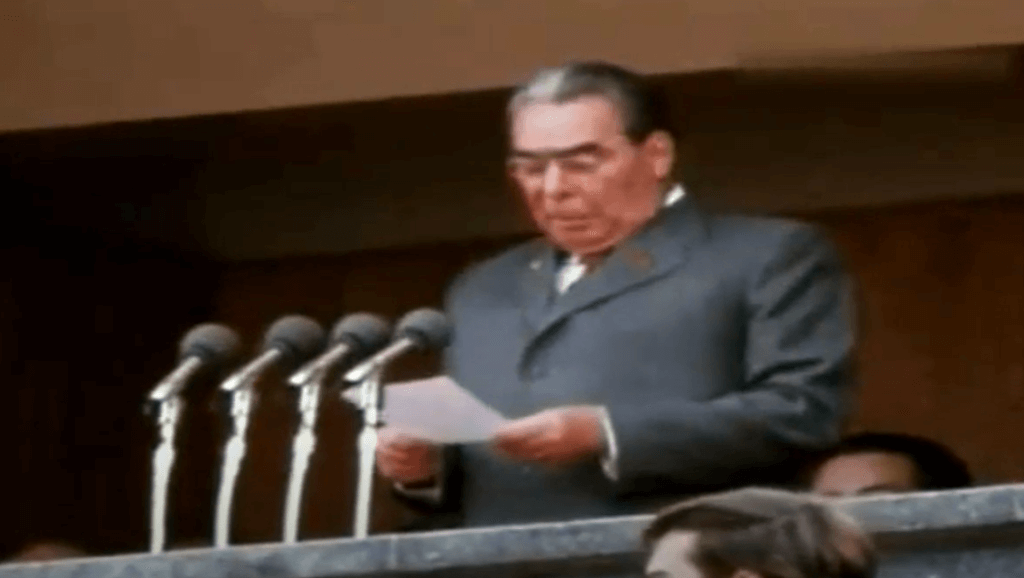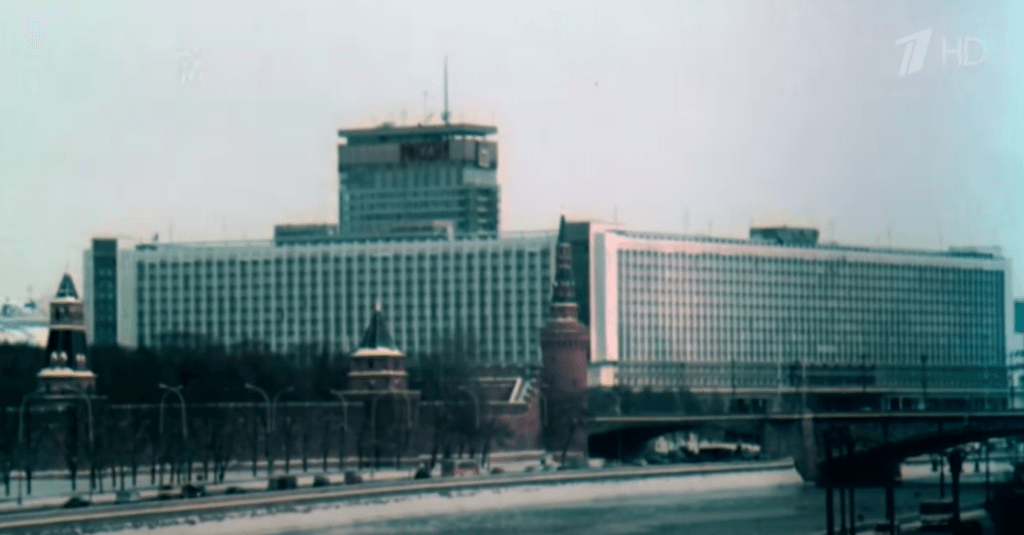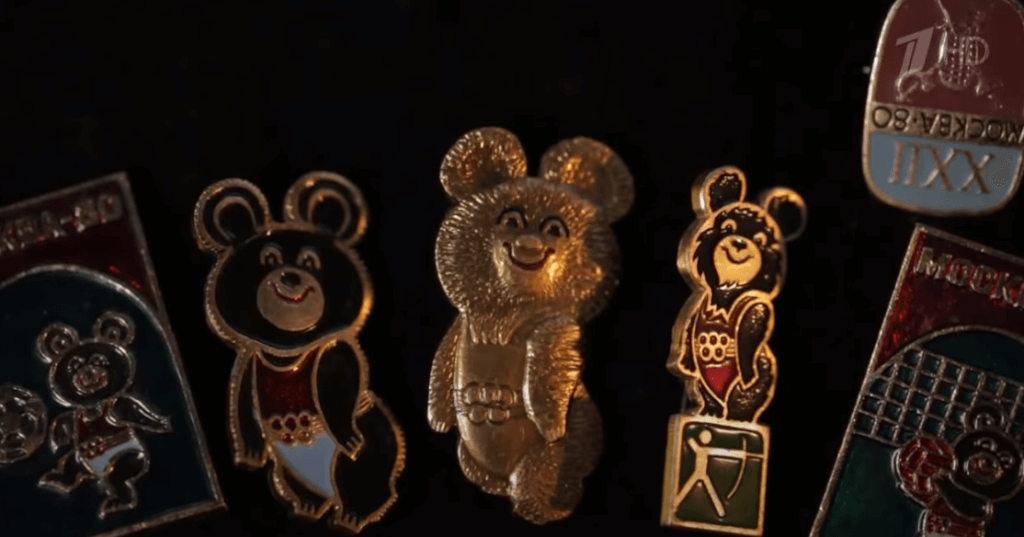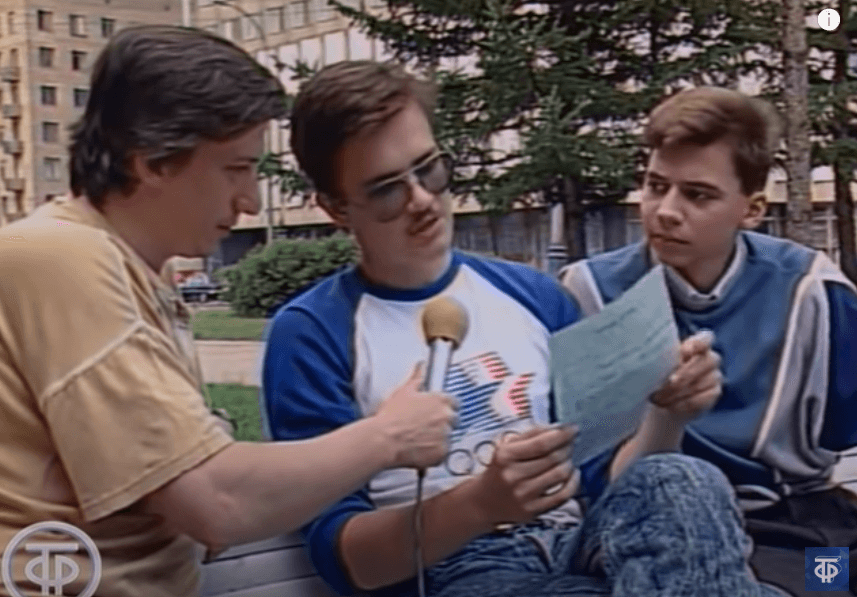Olympics-80: how the first cervelat was brought to the USSR and where the “affectionate Bear” flew
'17.07.2020'
Source: Woman.ru
In honor of the anniversary of the 1980 Moscow Olympics, we recall the most interesting moments of that hot summer. There was everything: fun, and the hunt for criminals who attacked Muscovites, and acquaintance with foreign sausage, and even one crowded funeral, writes Woman.ru.

This year we were left without the Olympics, which, if not for the coronavirus pandemic, started on July 23 in Tokyo, Japan. Our athletes did not win medals, we did not learn about new athletes, swimmers and gymnasts, and did not discuss star guests. A large-scale event was postponed for a year. Well, we suggest returning to the past and recall the Olympics held in Moscow exactly 40 years ago.
So, on July 19, 1980, the 22nd Olympic Games were launched. There was a scandal.
As is known from history, more than 60 countries boycotted the Games due to the entry of Soviet troops into Afghanistan a year earlier. Again, this policy ...
It all started with the filing of American President Jimmy Carter, and after him the heads of other states announced that they would not send their athletes or would cut off their funding if they had the audacity to go to the USSR. The main event of the year was under threat.
In order to somehow defuse the situation, the Soviet government assured the population that “we are supported by the majority, and those who do not come are not an indicator. After all, there will be as many as 80 countries, and only “65” will miss the games. Themselves at the same time tried to find an answer to the question "what to do". Any means were used. For example, before the visit to Moscow of the Chancellor of the Federal Republic of Germany Helmut Schmidt, the question of a present for him - a Niva car - was discussed.
They say that Brezhnev himself was against the Games. Why? Money! There are rumors about a note by the Politburo in which Leonid Ilyich says that he doubts the need for the event because of the enormous expenses for its organization. He allegedly even offered to pay a penalty for refusing to hold.

Experts do not believe in this. “Brezhnev perfectly understood the importance of the Olympic Games for him - for any statesman this is the greatest event. He was seen by the whole world when he uttered a phrase declaring the Games open, ”explained Vitaliy Smirnov, chairman of the Committee for Physical Culture and Sports of the RSFSR Council of Ministers, to Kazakhstan's Sputnik.
However, the financing issue was really acute: the budget was crashing, money was sorely lacking, the situation was getting out of control. Common people helped, as usual. Part of the funds was raised through the sale of Sportloto tickets.
New Moscow
So, in 1974, Moscow was declared the venue of the XXII Summer Olympic Games, preparation had to start immediately - for everything about everything for six years, and it took a lot to do.
The government could not afford to fall face to face with dirt, and therefore a large-scale construction project was waiting for Moscow. The Sports Palace on Prospect Mira, the Olympic pool and the stadium, the cycle track in Krylatskoye - this is only part of the facilities that were erected. Some of them had to pay too high a price - several residential areas were wiped off the face of the earth.
In connection with an unprecedented influx of foreign guests, it was decided to build a separate international terminal at Sheremetyevo Airport - the former Sheremetyevo-2, the current Sheremetyevo F.
It was there that on July 26, 1980 at 2 p.m. a small twin-engine aircraft Lauda Air (now part of Austrian Airlines) landed. Nicky Lauda, the owner of the airline and two-time Formula 1 champion, personally sat at the helm of the ship. He was also a close friend of Elizabeth Toirer, an Austrian horsewoman who became Olympic champion that summer.
The story is generally wonderful. The Austrian Equestrian Federation strongly recommended its best representative not to go to Moscow, but to avoid temptation, refused to pay for its flight. For a 23-year-old girl, this was not a problem, because her dad is a large industrialist. But how to get to Russia? The situation was complicated by the fact that she was not alone, but in the company of her horse, nicknamed Mon Cherie.
It was Niki Lauda who took over the transportation. Having disassembled a part of the cabin, he was able to make room for the beautiful Mont Cherie and for the support group Elizabeth, which included her coach and husband. “The horse looked all the way into the cockpit and neighing joyfully,” Toirer recalled in an interview with the Championship portal. The company was in a great mood all the way. Yes, and the Olympics itself, in which, recall, she won gold, the girl remembered with warmth. The only thing that darkened the trip was the ban on living with the groom (we will talk about this separately). But Hans Max was able to appreciate the service of the newly opened hotel in Izmailovo. Yes, it was also erected exactly for the Olympics.

The hotel worked on unprecedented services for those years: systems for air conditioning, for extinguishing a fire, for accounting rooms, dust and smoke removal.
Technical innovations also appeared in the subway - fast escalators, electronic clocks showing time accurate to the second, new cars. It was then that the underground spoke for the first time in English: “Mind the door, next stop ...” During the preparation for the Games, many stations “became younger” due to the ceramic decoration of the walls.
Ladies, get out!
In parallel with the construction of new buildings, the central streets were actively cleaned and ennobled. For their cleaning, Mercedes Unimog cars were ordered from Germany, which served faithfully for another 20 years after that.
The task was clear: foreign guests should not see any garbage. People with a dubious reputation were also referred to him.
Homeless people, alcoholics, former criminals, illegal taxi drivers - all were sent together for the 101st kilometer.
Pointed out and girls "with low social responsibility." The toilers of the home front were tracked down for several weeks.

In the period from 1970 to 1980 in the USSR there was an unprecedented rise in prostitution, even though such work was illegal and criminally punishable. “Night butterflies” fluttered in various places depending on their professional status: at train stations, parks, restaurants. A separate category serving foreign citizens worked in hotels. By the way, only they managed to stay in the city during the Games. Helped communication and money.
Link to the camp
Not only asocial elements, but also children were expelled from the city urgently. It was ordered to send to the village to my grandfather or to the camps (then the shifts were 40 days each). The schoolchildren were looking forward to the main holiday of the year, but did not want to see them there. Why - a question to which there is still no single answer. This decision was notified to everyone six months before the Olympics.
On the subject: Cognac for tooth extraction, illiterate students and infernal childbirth: what was actually medicine in the USSR
“If there is no way to send a child to the camp, the union will help you,” class teachers read on a piece of paper from RONO. In order for their parents to understand the seriousness of the situation, they were intimidated by harmful overseas chewing gum (“After all, your children will be poisoned!”) And overseas diseases.
As for students, many of them were involved in working with foreign groups. According to the recollections of our reader, this process could not be called interesting, rather creepy: long preparation, employment from morning to evening, lack of payment. There were only two pluses - the practice of a foreign language and a set of uniforms with Olympic symbols, consisting of trousers (for boys), skirts (for girls), a shirt and (oh, miracle!) Sneakers. Yes, not some, but Adidas!
Mysterious criminals
22 police officers dressed in snow-white uniform were responsible for security in the city. Law enforcement agencies worked with a plus, as noted by the media. During the Games, there was absolutely not a single crime in the city. It was possible to prevent the “dangerous” gang, which frightened many Muscovites. Let's tell.
A few days before the opening ceremony, three dozen women addressed the Sklifosovsky Institute with the same complaint - they found a syringe mark on different parts of the body (neck, shoulder, back, arms, legs). So they suggested themselves. None could explain anything plainly, but each accurately remembered the following: she was walking along the street, she suddenly felt a sting-blow, there was a slight bleeding.
On the subject: Ninel Kulagina: a woman with superpowers or the most popular quack in the USSR
Rumors scattered instantly, and the shock version immediately appeared: a foreign saboteur (or even a whole gang) is planning to disrupt the Olympics.
A special detachment was assigned for an urgent investigation, ordered to act quickly and harshly. The results of the operation deprived the leadership of the words: “criminals” were a group of young people suffering from idleness. In order to entertain themselves, they made slingshots, and instead of pebbles they used metal brackets. Hiding in the bushes, unfortunate idlers shot at the girls passing by. They squealed loudly from surprise and pain, and these guys rolled with laughter. He, however, quickly and permanently ceased.
Cornucopia
The Soviet government decided to impress foreign visitors not only with clean streets and beautiful new buildings, but also with a wealth of choices that capital shops could not boast at that time. Those who were born after the eighties cannot imagine the same, like kilometer-long lines for goods, empty counters, personal invitations to buy shoes, products for coupons.

This could not be allowed, just as it was impossible to show the available meager assortment in unremarkable packaging.
They began to import imported goods to Moscow. Again the recollections of our reader, who witnessed the events of those years: “In the stores there were products that we saw only in films or magazines: juices packaged in 200 ml in rectangular and triangular packages with plastic tubes, which were real exotic for us. Before (and, by the way, after) it was possible to buy drinks only in liter and 3-liter cans. That summer I first tried Finnish cheeses and sausages, sliced in portions, in beautiful vacuum packaging. Yes, it’s beautiful, because there was nothing like that in the Union. Berry jams (raspberry, cherry, strawberry, blueberry, apricot) in metal buckets, which people later used in the household, were especially delighted. The taste seemed extraordinary! ”
Foreign liqueurs and liqueurs, mustard in tubes, butter in portioned packages, Fanta, Coca-Cola - gasped not so much foreigners (for them all these products were commonplace), as Soviet people. The people spent all the money on food - any products, getting on the counter, were immediately swept away.
Pies instead of cheeseburgers
If they were lucky, it was in 1980 that Moscow residents would have tasted food from McDonald's for the first time. The famous company came up with a proposal to build as many as three restaurants, but they were not allowed. The Soviet government reasoned like this: what burgers, if we have fried pies with liver, potatoes and cabbage?
On the subject: 'Wretched dishes of Soviet cuisine': what treats from the USSR we do not miss
Maybe it's for the better - the guests of the capital have the opportunity to taste real Russian cuisine, and with it taste Ukrainian borscht, Uzbek pilaf, Georgian barbecue and hundreds of other national dishes.
The gastronomic part of the Olympics was handled by a separately assembled team, which could only be reached through the competition “For participants and guests of the Olympics-80 - a high service culture”: dozens of experts had to identify the best cooks, confectioners, bartenders and waiters. Each winner was "especially correct, well-mannered, impeccable in work."
Selected candidates completed their work by 10 points out of 10: many athletes shared their memories of tables that were crammed with the amount of food and “incredible dishes”. For example: a typical Olympic athlete's breakfast menu included sturgeon with mayonnaise, roasted venison, rich broth, grilled sausages, rice pudding with fruit sauce.

Shelves filled not only grocery, but also other stores - Soviet fashionistas went hunting. Their goal was not even jeans, which in those years could be bought only from speculators, but velvet pants - it was in them that Western athletes defiled along the streets of the capital. The list of compulsory purchases also included safari dresses, “paper” windbreakers and real Adidas sneakers.

By the way, it was this "capitalist brand" that wore the Soviet team. Although, until 1980, the uniform of our Olympians was developed in the All-Union House of Models, and was sewn in Armenia. But this time was special.
Brand recognition - its main value for the people in those years - was erased by the party leadership: companies were banned from labeling, and three brand strips were replaced with one.
In bunks!
Athletes lived in a specially built Olympic village. No-frills rooms designed for two: each has beds, wardrobes, bedside tables with miniature floor lamps, a couple of chairs; on the floor - herringbone parquet; on the walls - wallpaper with a pattern.
They were settled according to gender - men with men, women with women. And they strictly followed that no night walks. And what is the Olympics without new acquaintances with a pleasant continuation? The foreign guests were very unhappy with this approach. They simply did not know that there was no sex in the Soviet Union. So the daily discos are only until 22:00, and then - all in bunks. Yours!
But can this circumstance and the floor attendant stop young, active and hot guys? Of course not! The guests of the capital fled for walks in the company of pretty Muscovites, and the next spring in Moscow there was a boom in the birth rate of charming mestizos, who are popularly called "children of the Olympics."
The funeral of Vysotsky
That summer, the main event of the capital was only the Olympics - nothing else could (and should not) overshadow it. All newspapers wrote only about new records and victories, and journalists reported in their reports on the high level of training and the positive impressions of foreign guests. The issue of Vecherka was devoted to this, in which an attentive reader could learn about another important (but, alas, sad) event.
In a short note, which cost the editor of the post, a couple of lines reported that the farewell to Vladimir Vysotsky would take place on Taganskaya Square. The famous poet and songwriter died on July 25. In a dream, from a heart attack.
On the subject: Married to Vysotsky: Lyudmila Abramova - about marriage with a bard, children and life after
The city authorities made every effort to prevent a large crowd of people, but how could that stop the fans! That morning, a crowd of thousands, stretching out to the Kremlin, walked in a silent formation, not holding back tears, not hiding their grief.
The powers that be were afraid that the people who went out into the street might behave unpredictably - what would Western media write then? And they wrote: about the death of a great man, and about popular love, and about how the public chanted “Fascists!” When watering machines washed off the scarlet roses and carnations left by Vysotsky’s fans.
With tears in his eyes
The main symbol of the Olympics-80 was "our affectionate Misha." His story is no less fascinating, and it began three years before the start of the Games. In 1977, a nationwide competition for the symbol of the competition was announced - a fierce struggle unfolded between several applicants: the Humpbacked Horse, Matryoshka, Petrushka, Los and Medved. The moose was a very serious competitor, but the good-natured Bear won.
Its author was the 42-year-old artist and illustrator of children's books Viktor Chizhikov. He later said that the idea to put on a bear a belt with Olympic rings came to him in a dream. For his Potapych Chizhikov received 1 rubles. Not a penny anymore. And do not even ask about royalties, thanks to which Viktor Alexandrovich could become a millionaire. Although the artist himself tactfully hinted about the leadership to them, to which he received the answer: “The entire Soviet people chose the symbol of the Olympics-300, which means that the author is the people.” It is logical!
Oh, and the organizers are worn out with this bear! He - 8 meters high and weighing 64 kg - did not want to take off. Tumbling in the air, rolling on its side, but not flying. At some point, they even wanted to change the scenario according to which Mishka had to crawl into the den in the final. Fortunately, I didn't have to.
On August 3, at 20:45, the main hero of the country was taken to the stadium - everyone gasped with admiration. Having made a semicircle of honor under song performed by Lev Leshchenko, Bear was in the center of the platform, from where, waving his paw, he flew up. The audience was sobbing, from small to large. It really was a holiday with tears in his eyes.
Many the next morning wondered: where did he fly away? The answers were different: from the banal “to the forest”, to the funny “abroad to the capitalists”. There were eyewitnesses who saw Bear landing on a beer stall in a residential area of the capital - supposedly the symbol of the Olympics with its weight broke the tent and greatly scared two of its regular customers. It would be better than it actually happened: a giant balloon landed near the stadium, was lowered and sent to the warehouse, where it lay for twenty long years, "dying" in the end from eternally hungry rats. Goodbye, our affectionate Bear!







